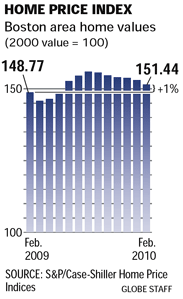February prices in area up from 2009, but down over Jan. 2010. The Boston area housing market is bouncing along the bottom.
That’s what several housing specialists concluded after the release yesterday of new data that show home prices in February were up slightly compared with the same month in 2009 but down from more recent months.
Home prices in the Boston area were 1.8 percent above February 2009 levels but down 1 percent from January 2010. The year-over-year increase is driven by a four-month surge in home prices that began in April 2009. But prices then started retreating in August.
Nicolas Retsinas, director of Harvard University’s Joint Center for Housing Studies, said the local housing market is stabilizing and overall signs are positive. “All the signs are the signs of recovery. It’s clearly not as good as it is going to be a year from now.’’
But Barry Bluestone, dean of the school of Public Policy and Urban Affairs at Northeastern University, said the housing market is being pushed in two different directions by opposing economic forces. Low interest rates, lower housing prices, a federal tax credit that expires this month, and buyers buoyed by an improving economy are combining to bolster the market. Pushing against that, however, is a growing pile of foreclosed homes that sit on the market, depressing prices. Foreclosure deeds jumped 51.4 percent to 1,389 in March from the prior month, according to the Warren Group.
“If we didn’t have so many of these foreclosures, one would expect housing prices would have stabilized a little more swiftly,’’ said Bluestone.
Nationwide, home prices are also nudging upward, according to the Case-Shiller index. In February, housing prices for the 20 major US cities in the index increased by 0.6 percent compared to a year ago, the first year-over-year increase since December 2006, according to S&P. The Case-Shiller index is viewed by many housing specialists as the most reliable barometer of housing prices because it measures repeat sales of the same home.
Karl E. Case, cofounder of the Case-Shiller indices and a retired Wellesley College economics professor, said Boston probably will see a recovery more quickly than many areas of the country because the state did not have the same problems with overbuilding as other parts of the country. Nationwide, housing values dropped about 30 percent since 2006, according to Case-Shiller data, while in the Boston area, home prices are down about 17 percent from the peak of the market here.
“I think it is at bottom,’’ Case said. “I think it will stay there for a while and, with luck, we have a chance for a good, solid recovery.’’
Boston was one of nine cities to show year-over-year housing increases, including San Francis co, San Diego, Washington, D.C., and Denver. Eleven cities showed price declines, including Las Vegas, Seattle, and Tampa.
Today, the Massachusetts Association of Realtors is expected to release data for March that will show continued pickups in both the number of houses sold and the prices paid for them.
Kevin Sears, a Springfield real estate broker and president of the state association, said prices and sales are increasing partly because 2009 numbers were very low.
Jenifer B. McKim Boston Globe April 28, 2010

No comments:
Post a Comment